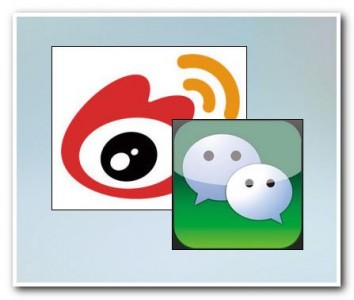There’s a battle brewing in Chinese social media between text and voicemail service WeChat and microblogging website Sina Weibo.
According to huxiu.com, recent research [1] completed by a third-party data-tracking service has shown that user activity on popular Sina Weibo has declined more than 30 percent compared to mid-2012. The research also suggested that the glory years of Sina Weibo, with more than 500 million users, passed by in 2011 and 2012 when the number of posts on the site peaked.
The research doesn't come as a surprise. Weibo users began to express their doubts in 2012 about Weibo's longevity when Chinese social media users began to spend more time on Tencent's WeChat instead of the microblogging service.
Launched in 2009, Twitter-like microblogging service Sina Weibo quickly gained popularity in 2010 and 2011 as an open platform to share news and stories. Since 2012, however, text and voicemail service WeChat has posed a threat to Weibo’s growth. WeChat has now reached more than 300 million registered users since its launch in 2011. The service is growing fast with ambitions to expand [2] overseas.

WeChat vs. Weibo
Another feature of WeChat is the public account service [3] launched in August 2012, which has attracted companies, such as media outlets, retailers, and e-commerce providers to use the platform as a new marketing tool. Though WeChat still does not generate profits, experts said that it is only a matter of time before the software starts to make money.
Despite the rise of WeChat as a fun tool and potential money-making business, it is unlikely to replace Weibo as a platform for debate and news due to its different functions.
Unlike Weibo, WeChat is a closed community where users stay in touch with friends. Like Facebook, users can share articles, pictures, and videos through their “friends circle.” Yet on Weibo, you can follow anyone you want, which makes it easy for information to go viral. So a picture of a corrupt official that could go viral on Weibo is unlikely to spread far and wide on WeChat.
In April 2013, there was a debate [4] on Weibo about WeChat’s threat to Weibo between Internet analyst Qian Hao and former Google China head Kai-fu Lee. Qian argued that one of the reasons Weibo is overvalued is because Weibo users are leaving the service due to real-name controls. However, Lee offered that “close supervision means vitality”, meaning the government wouldn't pay attention if Weibo wasn’t a threat.
Lee may be right, but he failed to mention that the real-name campaigns have been poorly implemented. Many users can get around that requirement. On the contrary, since WeChat is mobile-based service, the accounts need to be bound to a cell phone number, which makes it even harder for social activism. Even in the closed circle, Tencent, the company behind WeChat, censors [5] WeChat messages both in China and abroad, though the rules differ in different countries.
Despite the heavy censorship on Weibo, it has played an important role in fighting for social justice and environmental issues [6] and against corruption [7]. It has helped gather information and create awareness during disasters [8] and accidents.
As the only social media platform that has such a big impact on promoting the progress of Chinese society, Weibo can’t afford to lose the war with WeChat.